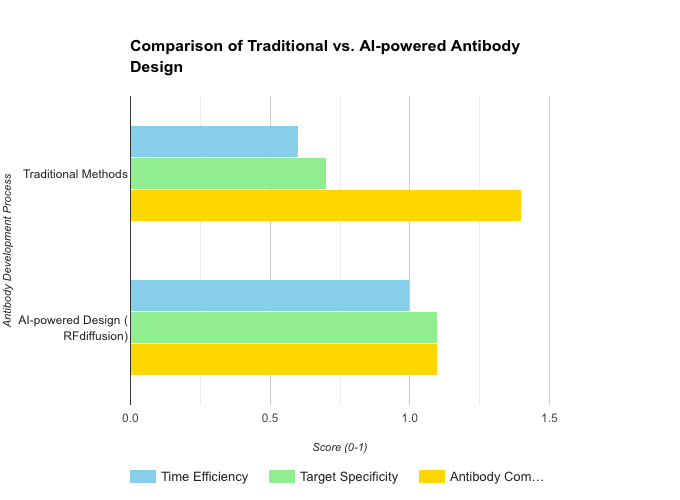In a groundbreaking stride forward for science, researchers at the University of Washington have achieved a remarkable feat: harnessing the power of Artificial Intelligence (AI) to engineer antibodies with unprecedented precision.
This innovative approach, led by the esteemed Baker Lab within the Institute for Protein Design, promises to reshape the landscape of biological therapies.
Gone are the days of laborious library screening and animal immunizations.
The groundbreaking use of artificial intelligence by researchers at the University of Washington in engineering antibodies promises to reshape the landscape of biological therapies, streamlining the process of generating antibodies and offering hope in the face of healthcare challenges like the COVID-19 pandemic and influenza outbreaks.
Check out more about it;
By leveraging deep learning protein design techniques, the researchers have unlocked the potential to create single-domain antibodies (VHHs) capable of targeting a myriad of pathogens, including those responsible for respiratory syncytial virus and influenza.
Related resources:
These VHHs, inspired by nature’s blueprint found in sharks and camelids, exhibit remarkable binding capabilities while being simpler to assemble from genetic code.
The implications of this breakthrough extend far beyond theoretical realms.

With the biologic therapeutics market poised to surge to new heights, computational antibody design holds the promise of cost savings and expedited drug development timelines.
As the demand for targeted therapies continues to escalate, the ability to rapidly engineer antibodies tailored to specific epitopes represents a game-changer in the fight against infectious diseases and beyond.
At the heart of this innovation lies the University of Washington’s open-source RFdiffusion program, a testament to the collaborative spirit driving scientific progress.
Building upon the success of pioneering software such as AlphaFold2 and Rosetta, RFdiffusion marks a pivotal step towards democratizing protein design and fostering cross-disciplinary collaboration within the scientific community.
But perhaps what is most exciting is the potential for further optimization and refinement.
While the researchers acknowledge that success rates are still in nascent stages, the prospect of revolutionizing antibody discovery and development looms tantalizingly on the horizon.
With continued advancements in AI-driven antibody discovery, the dream of personalized medicine tailored to individual patient needs is inched closer to reality.
It’s crucial to underscore the transformative potential of AI-driven antibody discovery.
This paradigm shift not only accelerates the pace of drug development but also enhances the precision and efficacy of therapeutic interventions.
By harnessing the computational prowess of deep-learning protein design, researchers can navigate the intricate landscape of molecular interactions with unparalleled finesse.

Furthermore, the collaborative efforts spearheaded by institutions like the University of Washington signify a collective commitment to advancing scientific knowledge and fostering innovation.
Through open-source initiatives such as the RFdiffusion program, knowledge-sharing becomes intrinsic to the scientific endeavor, propelling us closer to unlocking the mysteries of disease biology and therapeutic intervention.
Moreover, the advent of single-domain antibodies represents a triumph of biomimicry, drawing inspiration from nature’s arsenal of immune defenses.
These diminutive yet potent molecules promise to revolutionize not just biologic therapies, but our fundamental understanding of molecular biology and immunology.
As we stand on the cusp of a new era in medicine, characterized by the convergence of artificial intelligence and biotechnology, the possibilities are as vast as they are exhilarating.
From personalized medicine tailored to individual genetic profiles to rapid response strategies against emerging infectious diseases, the future of healthcare is imbued with the promise of innovation and hope.
Related resource
Conclusion
The convergence of computational antibody design and deep learning protein design represents a watershed moment in the realm of biological therapies.
As we stand on the precipice of a new era in medicine, one thing is abundantly clear: the future of drug discovery has arrived, and it’s powered by the boundless possibilities of artificial intelligence.
